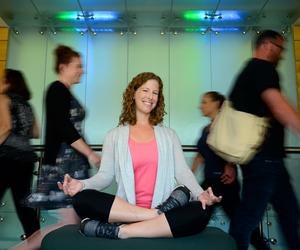An induced feeling of awe, or state of wonder, may be the best strategy yet for alleviating the discomfort that comes from uncertain waiting.
Kate Sweeny’s research explores the most excruciating form of waiting: the period during which one awaits uncertain news, the outcome of which is beyond one’s control. It’s waiting for news from a biopsy, or whether you aced — or tanked — the exam. That’s distinguished from waiting periods such as when looking for a new job, when you have at least some control over the outcome.

Her research has found some clues for alleviating those difficult periods. Meditation helps, as does engaging in “flow” activities — those that require complete focus, such as a video game.
“However, meditation is not for everyone, and it can be difficult to achieve a state of flow when worry is raging out of control,” Sweeny and her team assert in their latest related research, published recently in The Journal of Positive Psychology.
Sweeny, a professor of psychology at UC Riverside, has discovered what may be the best strategy yet to alleviate the most uncomfortable purgatory of waiting. That is, awe, defined in the research as a state of wonder, a transportive mindset brought on by beautiful music, or a deeply affecting film.
The research drew from two studies, for a total of 729 participants. In the first test, participants took a faux intelligence assessment. In the second test, participants believed they were awaiting feedback on how other study participants perceived them.
In both cases, they watched one of three movies that inspired varying levels of awe. The first was an “awe induction” video, a high-definition video of a sunrise with instrumental music. The second was a positive control video meant to elicit happy feelings, but not awe. The video was of cute animal couples. The third was a neutral video. In this case, about how padlocks are made.
Researchers found that those exposed to the awe-induction video experienced significantly greater positive emotion and less anxiety during the period waiting for IQ test results and peer assessments.
“Our research shows that watching even a short video that makes you feel awe can make waiting easier, boosting positive emotions that can counteract stress in those moments,” Sweeny said.
Sweeny said the research can be used to devise strategies for maximizing positive emotion and minimizing anxiety during the most taxing periods of waiting. Because the concept of awe has only received recent attention in psychology, the research also is the first to stress its beneficial effects during stressful waiting periods, opening new opportunities for study.
“Now that we know we can make people feel better through brief awe experiences while they’re waiting in the lab, we can take this knowledge out into the real world to see if people feel less stressed when they watch “Planet Earth” or go to an observatory, for example, while they’re suffering through a difficult waiting period,” Sweeny said.
Aside from Sweeny, other authors in the study, “Awe-full uncertainty: Easing discomfort during waiting periods,” include UCR doctoral candidate Kyla Rankin and former UCR graduate student Sara E. Andrews.


